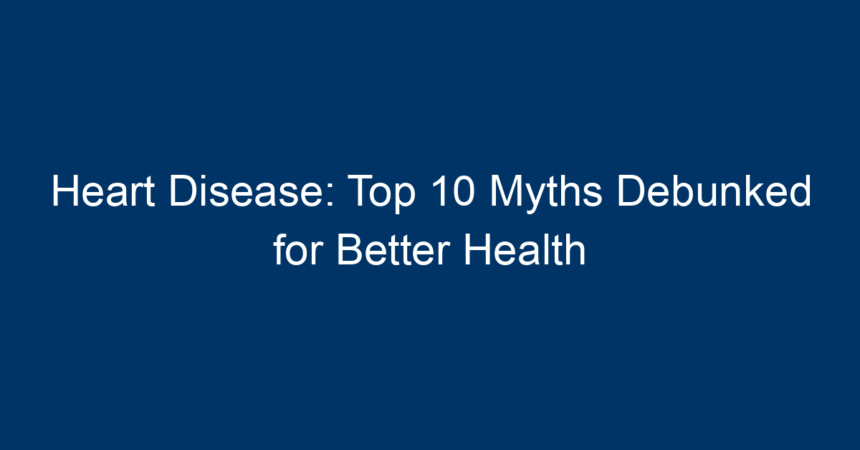Heart disease remains one of the leading causes of death worldwide, but despite its impact, misinformation abounds. Understanding the truth about heart disease is vital for prevention and effective management. In this article, we’ll debunk the top 10 myths surrounding heart disease, empowering you with the information you need for a healthier heart.
Understanding Heart Disease
Heart disease encompasses a range of conditions affecting the heart, including coronary artery disease, arrhythmias, and heart defects, among others. Risk factors can vary widely, including lifestyle, genetics, and other health conditions. Debunking myths surrounding heart disease can help individuals make informed decisions regarding their health.
Myth 1: Heart Disease Only Affects Older Adults
Fact: While age is a significant risk factor, heart disease can and does affect individuals of all ages. In recent years, there has been a noticeable increase in cases among younger populations, often linked to lifestyle choices such as poor diet, lack of exercise, and smoking.
Myth 2: Only Men Experience Heart Disease
Fact: This myth is pervasive but misleading. Both men and women are at risk for heart disease. Women often experience different symptoms, which can lead to underdiagnosis and mismanagement. Recognizing the signs and symptoms in women is crucial for effective prevention and treatment.
Myth 3: High Cholesterol is the Sole Cause of Heart Disease
Fact: While high cholesterol can increase the risk of heart disease, it’s not the only factor. Blood pressure, smoking, diabetes, and lifestyle choices, such as inactivity and poor diet, also play crucial roles. A comprehensive approach to heart health is essential.
Myth 4: Heart Disease is Inevitable if It Runs in the Family
Fact: Genetics can contribute to your risk of heart disease, but you can take proactive measures to mitigate this risk. Maintaining a healthy lifestyle, managing your weight, and staying active can significantly reduce your chances of developing heart disease, even with a family history.
Myth 5: You’ll Always Feel Symptoms Before a Heart Attack
Fact: Many heart attacks occur without any prior symptoms. This is known as a silent heart attack, and it often goes undiagnosed until it has caused significant damage. Regular check-ups and awareness of risk factors are essential for early intervention.
Myth 6: Only Unhealthy People Get Heart Disease
Fact: Heart disease can affect even those who appear healthy. Many athletes have suffered from heart conditions, underscoring the importance of regular screenings and not solely relying on outward appearances to gauge health.
Myth 7: A Healthy Diet Alone is Enough to Prevent Heart Disease
Fact: While a healthy diet plays a significant role in maintaining heart health, it is only one piece of the puzzle. Regular exercise, stress management, and avoiding smoking and excessive alcohol consumption are equally important in preventing heart disease.
Myth 8: You Have to be Overweight to Have Heart Disease
Fact: Thin individuals can also be at risk for heart disease. Factors like high blood pressure, high cholesterol, and blood sugar levels can afflict people of all sizes. Healthy body weight is important, but maintaining overall health is paramount.
Myth 9: Once You’ve Had a Heart Attack, There’s No Hope
Fact: A heart attack can serve as a turning point for many individuals. With proper medical intervention and lifestyle changes, many people lead healthy lives post-heart attack. Cardiac rehabilitation programs can help guide you through recovery.
Myth 10: Natural Supplements Can Cure Heart Disease
Fact: While some supplements may support heart health, they should not replace conventional treatments. Always consult with a healthcare provider before starting any new supplement, especially if you have existing heart conditions. Balanced nutrition, backed by medical advice, is the best strategy.
Actionable Insights for Heart Health
Now that we’ve debunked common myths surrounding heart disease, it’s time to focus on what you can do to support your heart health. Here are some actionable insights to incorporate into your daily routine:
1. Regular Check-Ups
Make it a priority to have regular check-ups with your healthcare provider. Screenings can help catch risk factors early, giving you a proactive approach to heart disease.
2. Maintain a Balanced Diet
Adopt a heart-healthy diet rich in fruits, vegetables, whole grains, and lean proteins. Foods high in omega-3 fatty acids, such as salmon and walnuts, can also be beneficial for heart health.
3. Exercise Regularly
Aim for at least 150 minutes of moderate aerobic activity each week. Activities like walking, cycling, and swimming can significantly improve cardiovascular health.
4. Manage Stress
Engage in stress-reducing activities such as yoga, meditation, or deep-breathing exercises. Chronic stress can affect your heart, so finding healthy outlets is essential.
5. Avoid Smoking and Limit Alcohol
If you smoke, seek help to quit. Also, limit alcohol intake as excessive consumption can lead to high blood pressure and other heart-related issues.
6. Know Your Numbers
Stay informed about your cholesterol levels, blood pressure, and glucose levels. Understanding these numbers can help you manage your heart health better.
7. Stay Hydrated
Drinking enough water daily aids in maintaining overall health, including heart health. Aim for at least eight glasses of water a day.
8. Educate Yourself
Stay informed about the latest research and recommendations regarding heart disease. Knowledge is power when it comes to prevention and management.
Conclusion
Heart disease is a critical health issue that demands attention and understanding. By debunking common myths, you empower yourself and others to recognize the signs, take preventive measures, and adopt a healthier lifestyle. Remember that heart disease is multifaceted, involving various factors beyond just age or weight. For a healthier future, take actionable steps toward managing your heart health today. With the right information and proactive measures, we can all contribute to reducing the impact of heart disease.




